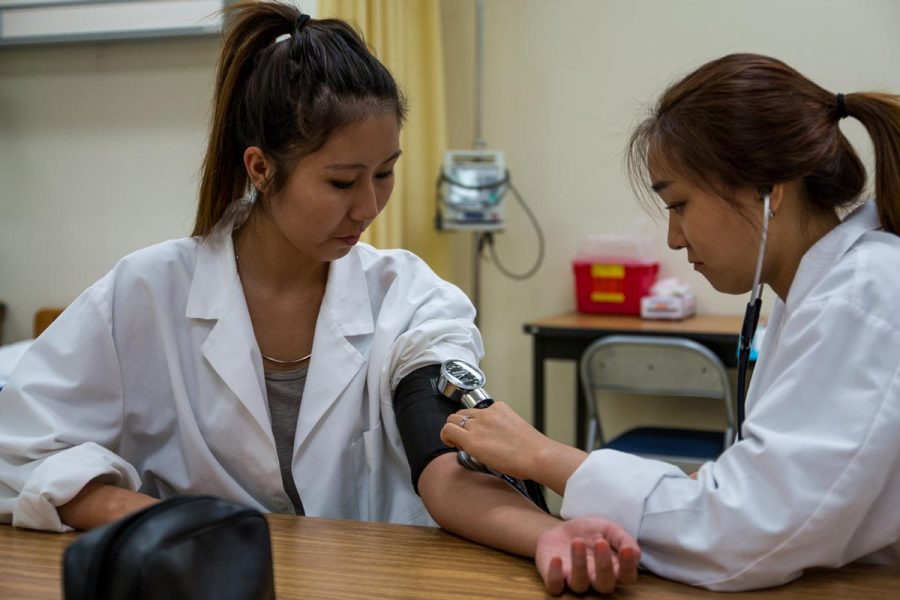Biola responds to Ebola outbreak
Biola’s intercultural studies and nursing programs prepare their students for serving overseas.
Nursing students Jin Lee and Eunice Lee practice taking each others blood pressure. Students involved in the nursing program are now preparing to serve overseas. | Aaron Fooks/THE CHIMES
September 14, 2014

The intercultural studies and nursing programs are taking steps to prepare their students for outreach overseas as the Ebola virus spreads throughout West Africa.
The Ebola virus reports a death toll of 2,400, which accounts for over half of the the 4,784 cases located in West Africa, according to Reuters in an article on Sept. 12. Despite the risk, many students are preparing to work overseas in areas where the Ebola virus is currently prominent.
NURSING DEPARTMENT PREPARES STUDENTS
More than half of the 39 nursing students intend on nursing overseas to help the medical needs of the countries in West Africa and the South Pacific islands, said associate professor of nursing Donnell Campbell.
“We frontload all of the content for community nursing . . . and then have no class for the month of March,” Campbell said. “Last year we sent 18 of our 39 students to Rwanda, Thailand, Mexico, Alaska and rural parts of northern California.”
The nursing program sends students on many different trips, said junior nursing major David Yi. These trips are very valuable because he has a strong desire to serve in numerous locations overseas, including Africa, Yi said.
Nurses are taught universal precautions and protocol for handling protective equipment, Campbell said. This includes procedures such as wearing gloves, gowns, masks and the washing of hands. This semester will also include Ebola within the epidemiology unit taught in her class, Campbell said.
“I want to bring in elements that are current in today’s world,” Campbell said.
ICS SUSTAINS MISSIONAL OUTREACH
The ICS department shares the nursing program’s vision to equip students for work overseas. Professor in the ICS department agree that students planning to work overseas need to prepare for crises such as the outbreak in West Africa.
It is fundamental to follow Jesus’ example of caring for the sick and hurting, said assistant professor of ICS Dr. Moussa Bongoyok.
“[Jesus] was someone very close to people suffering,” Bongoyok said.
ICS associate professor Dr. Nehrbass translated the New Testament into native languages of the South Pacific for 10 years. During his time there, Nehrbass and his family all had malaria more than once, he said.
“Death seemed to be much more common where we were, as opposed to America,” Nehrbass said.
Many students are eager to venture into countries with epidemics to evangelize and care for those suffering from disease.
“It’s the perfect opportunity to share the gospel with people who are hurting,” said communications studies major Amber White.
The risk of contracting ebola is worthwhile if it means proclaiming the truth of the gospel, said junior ICS major Jeremy Soh.
However, ministry in Africa extends beyond containing an epidemic, Nehrbass said.
“Something like ebola is a political issue, an economic issue and it’s an issue of sanitation and hygiene. Missions needs to address all of these or it’s not holistic,” Nehrbass said. “Even after ebola is long forgotten, the proclamation of the gospel will always be an emergency.”







